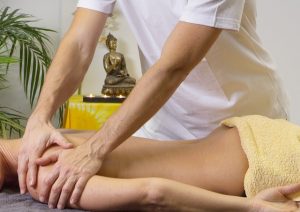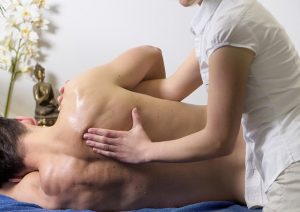What is deep tissue massage?
 Deep tissue massage is a type of massage therapy that focusses on the deep layers and fascia of the body. It is helpful for chronic aches and pains, restricted movement, and tense and contracted muscles. If you are suffering from a stiff neck, sore shoulders, tight legs or muscle 'knots', then deep tissue massage could be for you!
Deep tissue massage is a type of massage therapy that focusses on the deep layers and fascia of the body. It is helpful for chronic aches and pains, restricted movement, and tense and contracted muscles. If you are suffering from a stiff neck, sore shoulders, tight legs or muscle 'knots', then deep tissue massage could be for you!
Deep tissue massage draws on conventional massage techniques, but the pressure is usually deeper, slower and more focussed than in a traditional relaxation massage. It may be restricted to a certain area, such as the back, shoulders and neck, or could be used as part of a full body session.
What happens during a session?
In the first session, we will go over your medical history (including any injuries and surgeries you may have had) and discuss how you use your body for work and recreation, as well as finding out what your goals are for treatment. Once you're on the table, the work is slow, deep and can sometimes incorporate your own movement, attention and breathing to maximise its effectiveness. Since it can be helpful to maintain a good stretch on the skin and underlying connective tissues, we may use very little in the way of lubrication - just a little oil or lotion when needed.
During the session, we may use our hands, fingers, thumbs, knuckles, fists, forearms and elbows in order to apply the correct amount of pressure to the parts of the body that need it the most. We will check in with you to make sure that the pressure is within your comfort range, and may ask for your feedback regarding how certain areas feel while we're working on them. Some people are very surprised at how tender a certain body part feels when it is worked on, and if the pressure feels too painful or uncomfortable, we will ease off in order to make it tolerable. If you are having to hold your breath, grit your teeth or clench your fists in order to deal with the sensations of the massage, then the pressure is too deep!
After your session you may be asked to apply ice or heat to the area worked on, and may be given a few stretches to prolong the benefits of the massage.
Does deep tissue massage hurt?
This work can be deep, but it will never be outside of your ability to cope with it. The general rule of thumb is that if you feel yourself starting to 'tap out' (i.e. employ coping mechanisms to deal with painful sensations such as thinking of something else or flinching away from the pressure) then the therapist has gone too deep, and needs to ease off. Contrary to the 'no pain, no gain' concept, working too deeply in any sort of manual therapy is actually counter-productive, as your muscles try to protect you by tensing up and shutting out whatever is causing the painful sensation, rather than opening up and receiving the work. You are always in control of the depth and intensity of the session.
For a day or two after your session, the areas that were worked on may feel a little tender, particularly if you are new to massage. This is normal and shouldn't last for long.
How often can I come in for sessions?
There is no standard length of time you need to wait in between sessions. Some people prefer to come in once a week, others book in for monthly 'maintenance' sessions, and some clients will just book in whenever they feel they need it. For those that prefer very firm pressure, it is advisable not to book in for more than two sessions a week, as the body needs time to recover from the deeper work.
What should I wear?
 Please wear whatever you feel comfortable in. Underwear or swimwear is usually best, so long as it's not too restrictive and allows access to most of your skin. You will be draped with a towel at all times, with only the parts that we're working on exposed.
Please wear whatever you feel comfortable in. Underwear or swimwear is usually best, so long as it's not too restrictive and allows access to most of your skin. You will be draped with a towel at all times, with only the parts that we're working on exposed.
When should I not get a deep tissue massage?
Please reschedule your session if you have a fever, cold, flu or other contagious or infectious condition. If you have a condition such as high blood pressure, diabetes, osteoporosis, cancer, HIV or have had any recent surgery, please check with your doctor before booking an appointment. This list is by no means exhaustive, so if you're not sure, check with your doctor first! By thoroughly filling your initial health history form and keeping us updated if anything changes, we will be able to advise you if you need to check with your healthcare practitioner before coming for treatment.
How should I prepare for a deep tissue massage?
A cleansing shower or warm bath is a great way to prepare for a massage session if you can. Eat lightly beforehand and abstain from drinking alcohol or caffeine on the day of your treatment - these directly affect the nervous system, and can have unwelcome effects when combined with massage. Prepare with less make-up or hair products than usual - if you still have to be out and about after your treatment, you may find it helpful to bring some products with you in order to to touch up your make-up afterwards - massage can play havoc with mascara! Face wipes, hair ties, spray deodorant and other little essentials are available if you need to freshen up.
It's important to speak up at any time if you are uncomfortable during your treatment. Some people get sinus congestion when face-down in the massage cradle so please say if you need a tissue or a sip of water. Equally if the pressure, temperature, music or anything else is not quite right please let us know and we'll be happy to adjust it for you.
Any more questions? Ready to book? Contact us now at info@entropytreatmentrooms.com
Text or call:
086 178 7575
